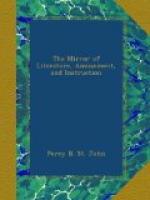T.B.
* * * * *
FROM CATULLUS.
(For the Mirror.)
My Lydia says, “believe me I speak true,
I ne’er will marry any one but you;
If Jove himself should mention love to me,
Not even Jove would be preferred to thee.”
She says—but all that women tell
Their doting lovers—I, alas! too well
Know, should be written on the waves or wind,
So little do their words express their mind.
T.C.
* * * * *
THE NOVELIST
* * * * *
GERMAN TRADITIONS.
I have a song of war for knight,
Lay of love for lady bright,
Faery tale to lull the heir,
Goblin grim the maids to scare!
SIR WALTER SCOTT.
Germany! land of mystery and of mind! birth-place of Schiller and Goethe, with what emotions does not every lover of romance sit down to peruse thy own peculiar, dreamy traditions! Thy very name conjures up visions of demons, and imps, and elfs, and all the creations of faery land, with their varied legends of diablerie, almost incredible in number and singular in detail—and romance, in his gloomy mood, seems here to have reared his strong hold.
At a time when a taste for the beauties of German literature is becoming general throughout this country, we conceive that a few specimens of her traditions may not be unacceptable to the reader. Few subjects are more interesting than the popular legends of a country, which are the source from whence many of our later novelists draw several of their writings: they offer a field for reflection to the contemplative observer of man; and those of Germany, although some are disfigured with a little too much absurdity in their details, are confessedly a mine of wealth to the lover of research in such matters. Here Schiller first drew the sources of his inspiration; here Goethe first electrified mankind with his writings—works which will render both immortal; it is, indeed, a mine which has been and will bear much working.
We have chosen the following tradition, both on account of the merit it possesses, and its being the unquestionable origin of Washington Irving’s inimitable Rip Von Winkle. Indeed, the similarity of the story is strikingly obvious. We believe there are several legends on this subject, which, with the present, probably all refer to the Emperor Frederic Barbarossa, whose adventures form the source of many a story among the Germans. The original tale is nearly as follows:—It seems the emperor was once compelled to conceal himself, with a party of his followers, amongst the Kyffhauesen mountains; there he still lives, but is under the influence of magic. He sits with his adherents on a seat before




